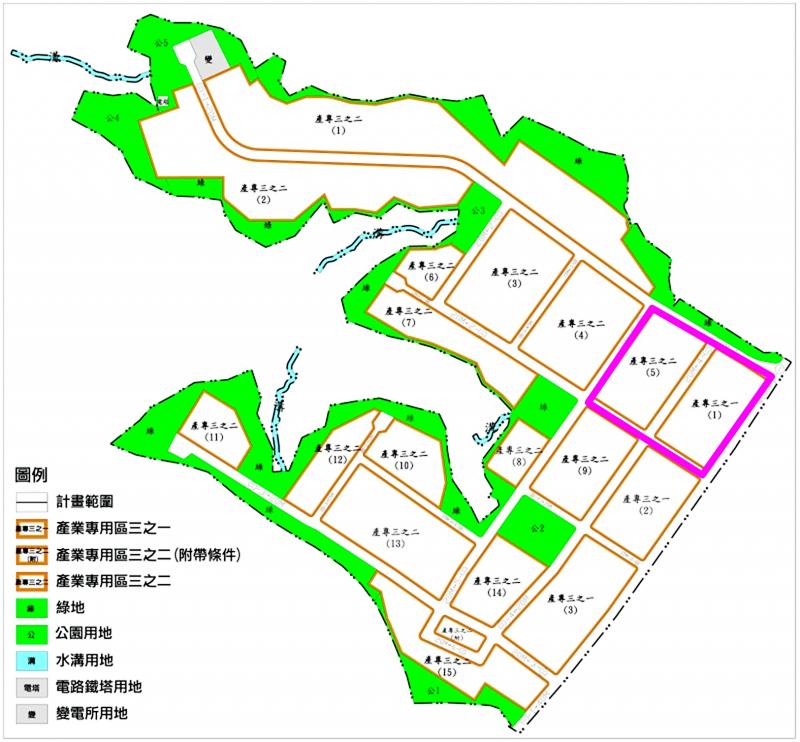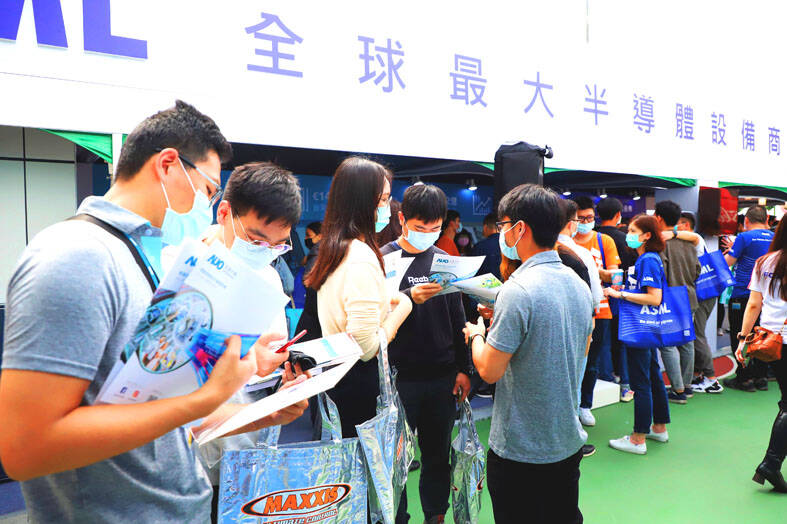Dutch chipmaking equipment supplier ASML Holding NV is planning to offer NT$1.6 million (US$51,331) or more in starting annual pay to engineers with a master’s degree at its sites in Taiwan.
The major supplier to contract chipmaker Taiwan Semiconductor Manufacturing Co (TSMC, 台積電) said it is keen to offer competitive compensation comprised of salaries, bonuses and other financial incentives as it seeks to expand its talent pool in Taiwan.
The company, which is planning to build a plant in New Taipei City, said engineers would in their first year be granted 10 days annual leave, compared with the minimum of three days per six months stipulated in the Labor Standards Act (勞動基準法).

Photo courtesy of the New Taipei City Economic Development Department
Starting from next year, ASML’s female employees would also get 14 weeks of maternity leave and male employees 10 days of paternity leave, compared with a legal minimum of eight weeks and seven days respectively.
Amanda Ho (何思穎), chief financial officer of ASML’s Taiwanese and Southeast Asian operations, said that 35 percent of the firm’s local employees have no engineering, science, technology or mathematics-related degrees.
ASML is committed to helping those workers build their careers, she said.

Photo courtesy of National Taiwan University of Science and Technology
In-house training programs would run six to 18 months, the company said, adding that it spends more than NT$5 million on training each new engineer.
The recruitment campaign is in line with the company’s new investment project announced earlier last week to build a new production complex in New Taipei City’s Linkou District (林口) to better serve its clients in Taiwan.
The New Taipei City Government said that the first phase of ASML’s investment is expected to total NT$30 billion, the company’s largest investment plan in Taiwan to date, with a campaign to hire 2,000 workers for the Linkou campus, which is to include production lines, offices, a research and development center, and logistics and warehousing operations.
ASML is the world’s sole supplier of extreme ultraviolet lithography (EUV) machines used by semiconductor manufacturers to produce cutting-edge chips.
In addition to TSMC, the company’s other prominent clients include Taoyuan-headquartered DRAM maker Nanya Technology Corp (南亞科技) and US-based Micron Technology Inc, which are planning to install EUV photolithography machines.
The Veldhoven, Netherlands-headquartered company has 60 operation hubs in 16 countries, with Taiwan as its largest hub in Asia.
In Taiwan, ASML has four client support centers, two research-and-development centers and two training centers, with its workforce expected to expand to 4,500 by the end of this year.

Nvidia Corp’s demand for advanced packaging from Taiwan Semiconductor Manufacturing Co (TSMC, 台積電) remains strong though the kind of technology it needs is changing, Nvidia CEO Jensen Huang (黃仁勳) said yesterday, after he was asked whether the company was cutting orders. Nvidia’s most advanced artificial intelligence (AI) chip, Blackwell, consists of multiple chips glued together using a complex chip-on-wafer-on-substrate (CoWoS) advanced packaging technology offered by TSMC, Nvidia’s main contract chipmaker. “As we move into Blackwell, we will use largely CoWoS-L. Of course, we’re still manufacturing Hopper, and Hopper will use CowoS-S. We will also transition the CoWoS-S capacity to CoWos-L,” Huang said

Nvidia Corp CEO Jensen Huang (黃仁勳) is expected to miss the inauguration of US president-elect Donald Trump on Monday, bucking a trend among high-profile US technology leaders. Huang is visiting East Asia this week, as he typically does around the time of the Lunar New Year, a person familiar with the situation said. He has never previously attended a US presidential inauguration, said the person, who asked not to be identified, because the plans have not been announced. That makes Nvidia an exception among the most valuable technology companies, most of which are sending cofounders or CEOs to the event. That includes

TARIFF TRADE-OFF: Machinery exports to China dropped after Beijing ended its tariff reductions in June, while potential new tariffs fueled ‘front-loaded’ orders to the US The nation’s machinery exports to the US amounted to US$7.19 billion last year, surpassing the US$6.86 billion to China to become the largest export destination for the local machinery industry, the Taiwan Association of Machinery Industry (TAMI, 台灣機械公會) said in a report on Jan. 10. It came as some manufacturers brought forward or “front-loaded” US-bound shipments as required by customers ahead of potential tariffs imposed by the new US administration, the association said. During his campaign, US president-elect Donald Trump threatened tariffs of as high as 60 percent on Chinese goods and 10 percent to 20 percent on imports from other countries.

INDUSTRY LEADER: TSMC aims to continue outperforming the industry’s growth and makes 2025 another strong growth year, chairman and CEO C.C. Wei says Taiwan Semiconductor Manufacturing Co (TSMC, 台積電), a major chip supplier to Nvidia Corp and Apple Inc, yesterday said it aims to grow revenue by about 25 percent this year, driven by robust demand for artificial intelligence (AI) chips. That means TSMC would continue to outpace the foundry industry’s 10 percent annual growth this year based on the chipmaker’s estimate. The chipmaker expects revenue from AI-related chips to double this year, extending a three-fold increase last year. The growth would quicken over the next five years at a compound annual growth rate of 45 percent, fueled by strong demand for the high-performance computing